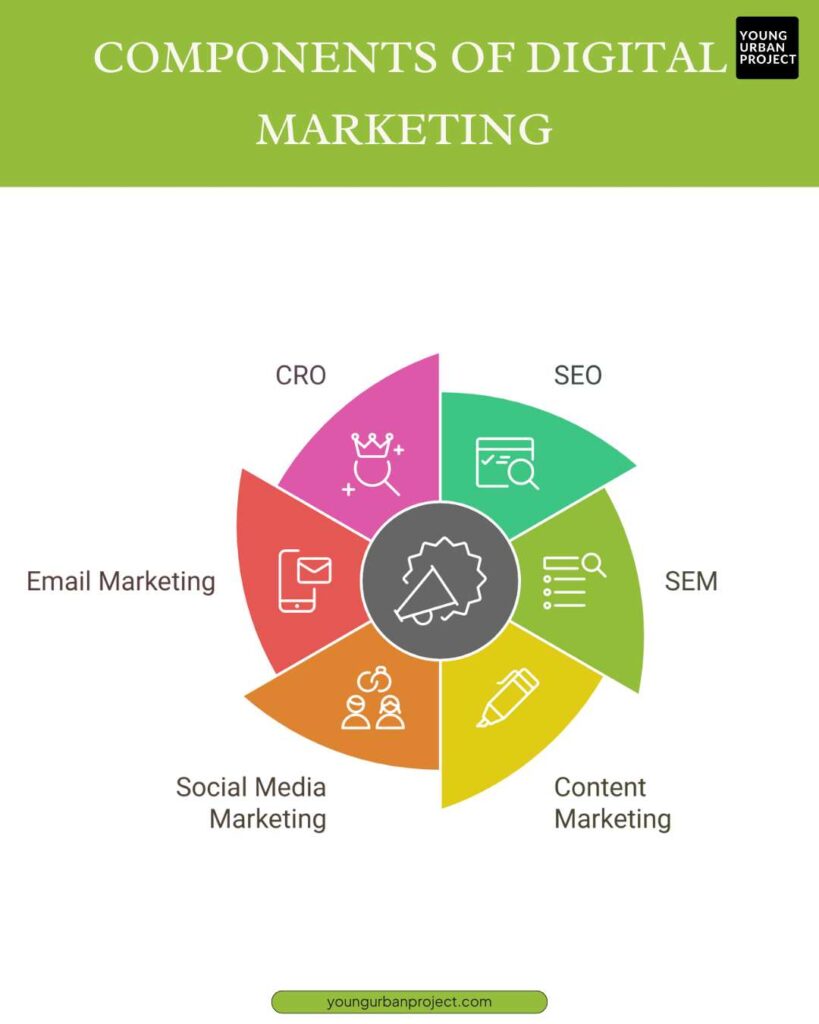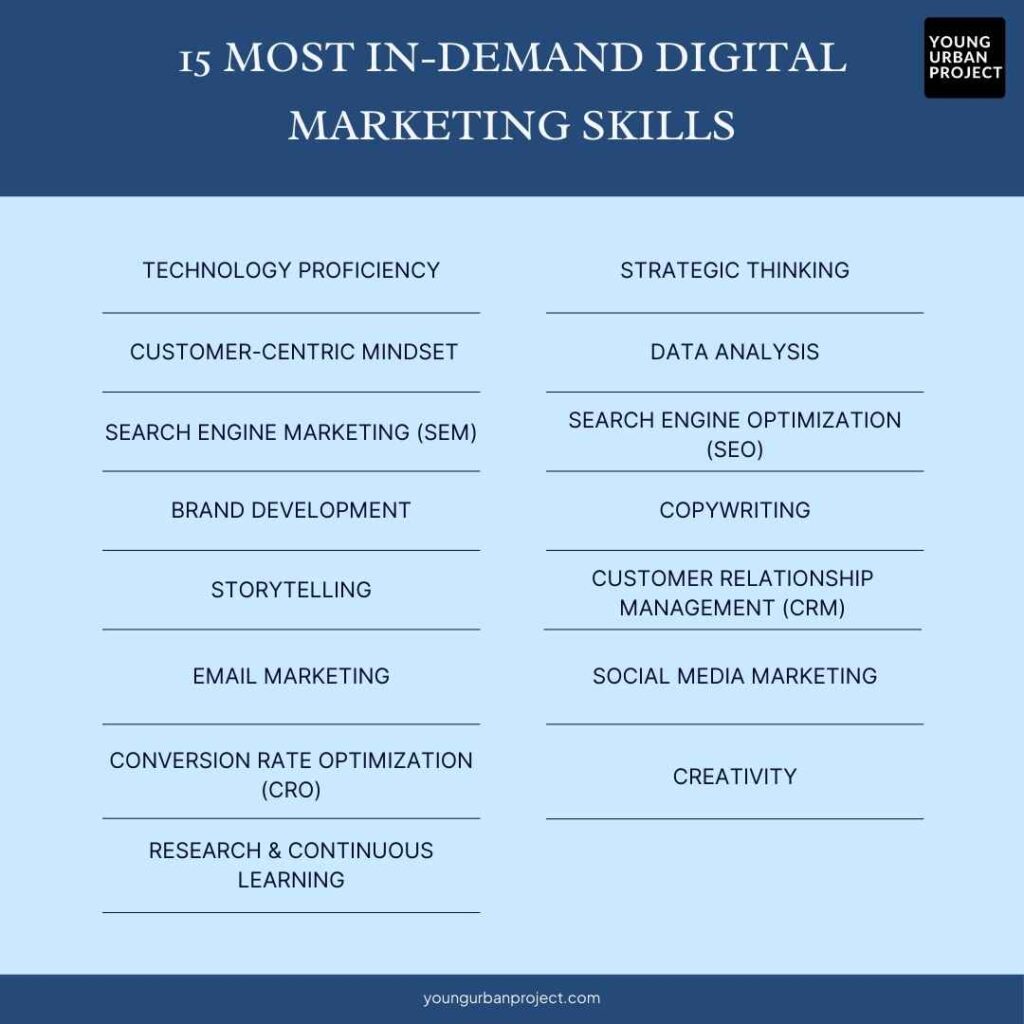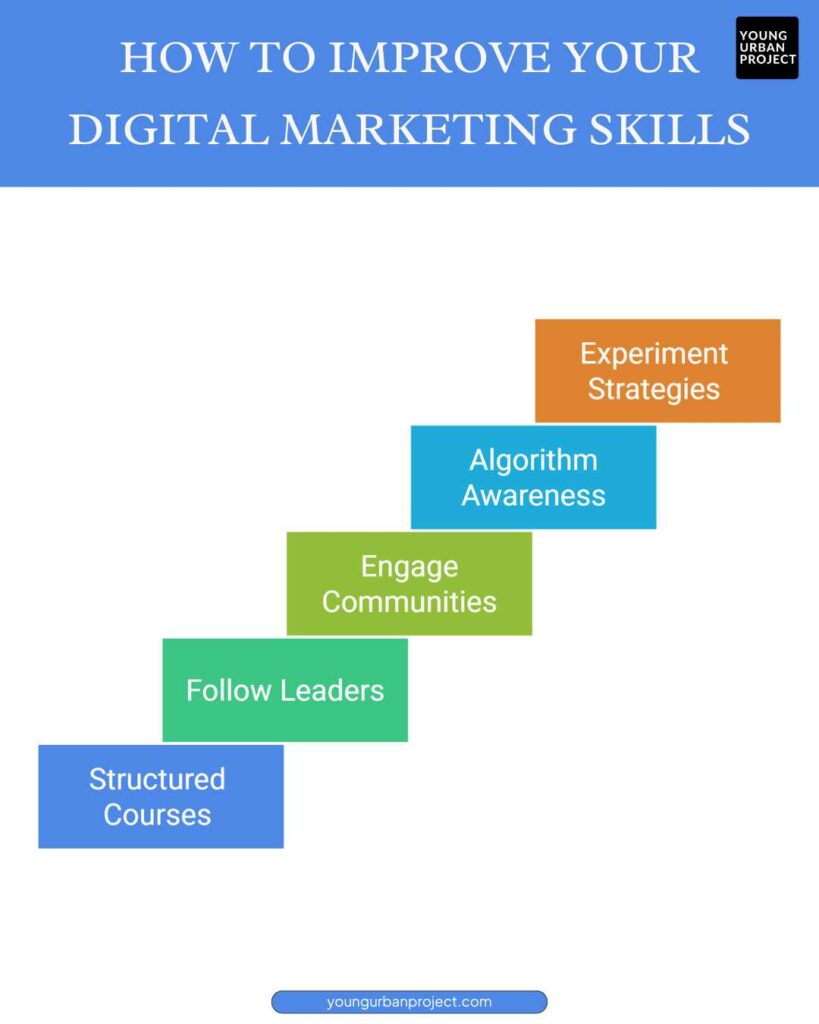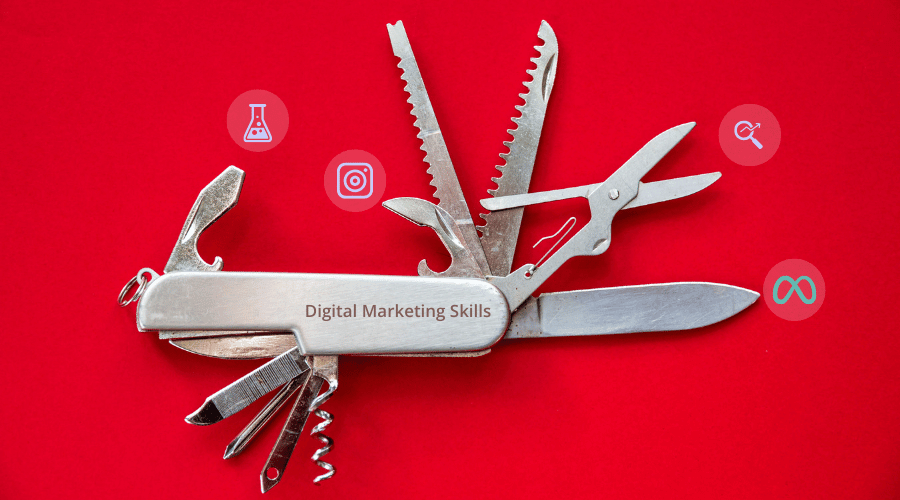Want to make money online? Build a brand? Grow a business? Get a high-paying marketing job? You need digital marketing skills.
Table of Contents
If you’re a digital marketer looking to level up, or a beginner exploring the field – mastering digital marketing skills is non-negotiable. From search engine marketing (SEM), to social media marketing (SMM) – the right mix of technical expertise and soft skills can set you apart.
Let’s get an in-depth understanding of digital marketing, the must-have skills, and how to sharpen them to become a successful digital marketer.
What is Digital Marketing?
Digital marketing refers to promoting and selling products or services using online channels. Unlike traditional marketing (non-internet channels), it is data-driven, interactive, and highly targeted.
It includes:

- Search engine optimization (SEO) – Ranking higher on Google
- Search engine marketing (SEM) – Running ads on search engines
- Content marketing – Creating valuable content to attract an audience
- Social media marketing – Promoting brands on social media platforms
- Email marketing – Nurturing leads through personalized emails
- Conversion rate optimization (CRO) – Tweaking websites for better sales
Also Read: Digital Marketing vs Traditional Marketing
Why are Digital Marketing Skills Important?
- High Demand: Businesses across industries need skilled digital marketers to drive online growth.
There are 100k+ digital marketing job postings on Naukri alone.👇

- Lucrative Career Opportunities: Digital marketers can work in agencies, corporate settings, or as freelancers.
- Scalability: Online strategies allow businesses to reach a global audience.
- Cost-Effectiveness: Digital marketing offers affordable advertising options compared to traditional methods.
- Measurable Results: Tools like Google Analytics provide insights into campaign performance.
So, whether you’re a job seeker, entrepreneur, or content creator, digital marketing skills can open up numerous opportunities.
The Most In-Demand Digital Marketing Skills

1. Basic Understanding of Technology
Now, you don’t need to be a software engineer, but you do need to understand how digital marketing tools work. From analytic platforms to automation tools, technology plays a huge role in running efficient campaigns.
- Learn tools like Google Analytics, HubSpot, SEMrush, and Google Ads to track performance and optimize campaigns.
- Stay updated on AI-powered marketing tools that automate tasks like content creation, ad optimization, and customer segmentation. These tools can be ChatGPT, Claude, Gemini, Midjourney etc.
- Get familiar with Facebook (Meta) Ads Manager, email marketing platforms (like Mailchimp, Brevo, etc), and chatbot tools (like Botpress, ManyChat etc) to engage customers more effectively.
2. Strategic Thinking
Gaining Digital marketing skills isn’t just about running ads or posting on social media; it’s more about aligning your efforts with business goals. Without a proper strategy, even the best tactics won’t deliver long-term success.
- Identify audience pain points and come up with solutions that meet their needs.
- Develop data-driven marketing campaigns that focus on measurable results (leads, conversions, revenue).
- Think long-term instead of chasing short-lived trends. A sustainable strategy wins in the long run.
3. Customer-Centric Mindset
Your marketing should always put the customer first. People don’t care about your product; they care about how it benefits them.
- Understand customer behavior, pain points, and buying journeys, why they buy, when they buy, and what influences their decisions.
- Use customer feedback to optimize your messaging, content, and product offerings.
- Personalization is key: Customize your marketing to different customer segments instead of a one-size-fits-all approach.
4. Data Analysis
Every digital action (or event), whether it is a website visit, an ad click, or an email open, tells a story. To be a great marketer, you need to understand the data behind your campaigns.
- Learn Google Analytics to track website performance, traffic sources, and user behavior.
- A/B test ads, emails, and landing pages to see what drives the best engagement.
- Use data-driven insights to refine campaigns and improve Digital Marketing ROI.
5. Search Engine Marketing (SEM)
Want to drive traffic fast? SEM lets you run paid ads on platforms like Google Ads and Bing Ads to reach the right audience at the right time.
- Master Google Ads: Learn keyword bidding, ad copywriting, and audience targeting.
- Understand Quality Score: Better ad relevance = lower costs and higher rankings.
- Optimize landing pages to improve conversions and reduce ad spend.
6. Search Engine Optimization (SEO)
If SEM is the sprint, SEO is the marathon. Ranking organically on search engines takes time, but it’s a powerful way to attract long-term traffic.
- Optimize content for relevant keywords so your site appears in search results.
- Improve site speed, mobile-friendliness, and UX. Google really rewards user-friendly websites.
- Earn backlinks from reputable sites to boost domain authority.
Also Read: Advantages and Disadvantages of SEO
7. Brand Development
Customers buy from brands they trust. A strong brand doesn’t just look good—it resonates with your audience and builds credibility.
- Develop a unique brand voice and personality that sets you apart.
- Stay consistent across all platforms, from your website to social media, every interaction should reflect your brand identity.
- Engage with your audience authentically; brand loyalty comes from trust, not just sales pitches.
8. Copywriting
Words sell. Whether it’s an ad, an email, or a landing page, your copy must persuade, inform, and inspire action.
- Write compelling headlines that capture attention immediately.
- Use clear and concise language—no jargon, just value.
- Master the art of storytelling to make your messaging more engaging.
Copywriting Mastery is one of the most critical, yet underrated digital marketing skills.
9. Storytelling
People don’t remember features—they remember stories. A great marketing campaign makes the customer the hero.
- Create emotional connections with stories that showcase real customer experiences.
- Use storytelling in blog posts, ads, emails, and video content to engage your audience.
- Position your product as the solution in the customer’s journey.
10. Customer Relationship Management (CRM)
A CRM system helps you manage leads, track customer interactions, and nurture relationships for long-term success.
- Learn CRM tools like HubSpot, Salesforce, or Zoho to organize customer data effectively.
- Personalize marketing messages based on customer behavior and past interactions.
- Automate follow-ups and engagement to improve customer retention.
11. Email Marketing
Email marketing isn’t dead, in fact, it’s one of the most profitable marketing channels when done right.
- Build and segment email lists to send targeted messages.
- Craft attention-grabbing subject lines to boost open rates.
- Automate email sequences to nurture leads and convert prospects.
12. Social Media Marketing
A strong social media presence boosts brand awareness, customer engagement, and even sales. Here are the skills that are expected of you:
- Master platforms like Instagram, Facebook, LinkedIn, YouTube, and TikTok. Each has its own audience and content style.
- Use paid advertising on Facebook, Instagram, and Twitter to reach targeted audiences. Even LinkedIn and X offer paid advertising.
- Engage with followers and create interactive content to drive organic reach.
- Leverage ORM to boost the online reputation of a brand, and improve the sentiment around it.
13. Conversion Rate Optimization (CRO)
Traffic means nothing if visitors don’t take action. CRO focuses on turning visitors into leads and customers – which means, improving the conversion rate.
- Optimize landing pages with persuasive copy, strong CTAs, and clear layouts.
- A/B test different elements like headlines, button colors, and form fields to improve conversion rates.
- Use heatmaps and session recordings to see how users interact with your website.
14. Creativity
Marketing is part science, part art; and creativity is what makes campaigns memorable. Creativity is not always natural, you can learn it by consistently trying new things and consuming content that aligns with your voice.
- You need this creativity to develop unique ad campaigns that stand out from the competition.
- Experiment with different content formats, videos, infographics, podcasts, memes, etc.
- Think outside the box; sometimes unconventional ideas drive the best results.
15. Research & Continuous Learning
Digital marketing evolves fast. Staying ahead requires constant learning and experimentation.
- Follow industry blogs (like Search Engine Journal, afaqs), podcasts (CMO Podcast, Marketing School), and newsletters (like Crystal Clear newsletter by Young Urban Project – scroll till the end to subscribe to it) to stay updated on trends.
- Take online courses and attend webinars to sharpen your skills.
- Test new strategies and analyze the results—what works today may not work tomorrow.
How to Improve your Digital Marketing Skills
The digital marketing space is constantly changing. What worked last year might not work today. So, to stay ahead, you need to upgrade your digital marketing skills continuously.

Here’s how:
- Enroll in structured courses
Free resources are great, but structured learning can fast-track your success
Young Urban Project’s 12-Week Advanced Digital Marketing Course is designed for aspiring digital marketers and working professionals who want to level up.
This program provides hands-on projects, real-world case studies, and mentorship to help you implement winning marketing strategies immediately.
- Follow industry leaders
Experts like Neil Patel and Gary Vaynerchuk share valuable insights on building successful marketing campaigns and scaling brands.
You can also follow Young Urban Project on Instagram to get daily insights.
- Engage with communities
Join marketing forums, LinkedIn groups, and online mastermind communities to exchange ideas and stay updated on trends.
- Stay informed on algorithm changes
Google and social media platforms frequently update their ranking and engagement algorithms. Keeping up with these changes ensures your marketing efforts stay effective.
- Experiment and test strategies
The best way to grow as a marketing professional is to test different approaches. Analyze what works, refine your methods, and optimize your results.
💭Wrapping up…
Digital marketing isn’t just a skill but a superpower. Whether you’re looking to grow a business, land a high-paying job, or scale your personal brand, mastering digital marketing skills can open endless opportunities.
But here’s the thing: learning never stops. The industry evolves fast, and the best digital marketers stay ahead by continuously upgrading their knowledge, testing new marketing strategies, and adapting to trends.
So, where should you start? Pick one skill, dive deep, and practice. Whether it’s SEO, social media marketing, content marketing, or email marketing, focus on building expertise step by step.
Digital Marketing Skills – Frequently Asked Questions
What does a digital marketer do?
A digital marketer is responsible for promoting brands, products, or services using online channels. This includes running paid ad campaigns, optimizing websites for search engines (SEO), managing social media accounts, creating engaging content, and analyzing data to improve performance. The ultimate goal? Drive brand awareness, generate leads, and boost sales, all in the digital space.
What skills do you need for digital marketing?
To succeed in digital marketing, you need a mix of creative and analytical skills. Some key ones include:
SEO & SEM – Understanding how search engines work to improve website visibility.
Content Marketing – Writing compelling blogs, social media posts, and ad copy.
Social Media Marketing – Growing an audience and engaging users on platforms like Instagram, LinkedIn, and TikTok.
Email Marketing – Crafting effective email campaigns to nurture leads.
Data Analysis – Using tools like Google Analytics to measure campaign success.
Paid Advertising (PPC) – Running and optimizing paid ad campaigns on Google and social media.
Is digital marketing a good career choice?
Absolutely! Digital marketing is a rapidly growing field with plenty of job opportunities, remote work flexibility, and high earning potential. Plus, it’s a constantly evolving industry—so if you love learning and staying ahead of trends, it’s a great fit.
Why is digital marketing such a valuable skill?
Almost every business today needs a strong online presence to attract customers. Whether it’s a startup, an e-commerce store, or a multinational corporation, digital marketing helps them reach the right audience. That’s why companies are always looking for skilled digital

